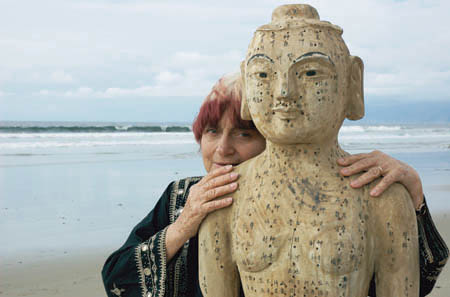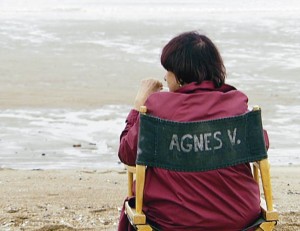Film Review: The Refreshing Beaches of Agnes Varda
By Justin Marble
“The Beaches of Agnes” At the Coolidge Corner Cinema

Director Agnes Varda and a friend in The Beaches of Agnes
If a motif exists in Agnes Varda’s sprawling new documentary, “The Beaches of Agnes,” it may just be the art of walking backwards. The 81-year-old director, famous among the art house crowd for French New Wave films like “Cleo from 5 to 7,” has a number of kooky tendencies that come to life when she turns the camera on herself, as she does here. Frequent shots of the tiny yet vibrant woman slowly walking backwards down a crowded street are bizarrely beautiful and fascinating, much like her new film.
Maybe Varda is going against the grain when she walks in the opposite direction of everybody else, as she has done her whole life. Maybe she is moving backwards through time, as she does in this reflective film. Or maybe she’s just a crazy old lady, something she would probably admit to herself. At different points throughout “Beaches,” it seems like all three might explain her motivations for making this deeply personal journey through her life story.
“Beaches” is Varda’s cinematic memoir, a look back at the places she has been, the people she has met, the stories she has heard over her entire life. While her life story forms the narrative thread that ties the film together, Varda will quite often digress; she follows strands she finds interesting, or takes time out to film herself against an odd backdrop. In that sense the film flows like a conversation over tea with somebody who has a unique perspective on life.
To watch somebody’s life story unfold over two hours of film would suggest that the subject is pretty important. And Varda is. She came up in the French New Wave, was married to the filmmaker Jacques Demy, and has been a powerful female voice in foreign cinema for many years. But we don’t connect with Varda because she is a famous film director, nor do we care about her because she has an eccentric sense of humor and style. We connect with her because she is human, and she has a talent for revealing herself onscreen.
At one point, Varda sits in a gallery with photos she took many years ago of her actor friends. Her voice over names each one and what she remembers about them, followed by the lament that they are dead. Onscreen, a hunched over, hauntingly vulnerable Varda leaves roses and begonias in front of each blown-up black and white portrait. In that moment she is not Agnes Varda, auteur. She is Agnes Varda, person. And the film succeeds because she is able to express herself in this way without seeming phony or artificial.
A large part of the film revolves around her relationship with the director Jacques Demy, and again, these are moments where Varda shines. It has been almost twenty years since Demy’s death, and the film shows Varda remembering him fondly while still struggling with his absence. Although she sometimes uses reenactment (often transforming the landscape into something dreamlike and unrealistic), much more of the film proffers personal photos, film clips, and home movies. But Varda approaches all of this humbly and honestly; admitting her faults, celebrating her success, and never seeming egotistical.
 Often, “The Beaches of Agnes” isn’t even about Agnes, but the people she has encountered over the years. In telling their stories, Varda reveals herself. A grand raconteur, Varda has an unquenchable thirst for the experiences of others. One section of the film sees the director revisiting her childhood home. While she recounts her own memories, she is distracted by the current tenants, a kindly couple who collect model trains. Pointless? To some, perhaps. Yet the way Varda’s camera lingers on these moments gives them a weight that suggests otherwise.
Often, “The Beaches of Agnes” isn’t even about Agnes, but the people she has encountered over the years. In telling their stories, Varda reveals herself. A grand raconteur, Varda has an unquenchable thirst for the experiences of others. One section of the film sees the director revisiting her childhood home. While she recounts her own memories, she is distracted by the current tenants, a kindly couple who collect model trains. Pointless? To some, perhaps. Yet the way Varda’s camera lingers on these moments gives them a weight that suggests otherwise.
Though the film is a documentary, Varda has no grand social statement to make. In fact, it feels more like Varda uses cinema to discover something about herself. The idea of the camera as a mirror is interesting, and Varda illustrates that by devoting a section of the film to her struggle to make “Jacquot de Nantes,” Demy’s life story, as he lay dying. Knowing that Demy’s death was imminent, the film ends up as catharsis for Varda, a way of dealing with his passing. Parallels must be drawn to this film. Death hangs over “Beaches,” in the sense that this film is ultimately Varda’s thoughts on the time she has spent here. Yet there is no sense of dread, rather, the film is informed by Varda’s earnest and inspirational love of life.
Varda’s previous feature-length documentary, “The Gleaners and I,” was different in the sense that it at least marginally focused on an issue, that of a group of people who picked through trash in order to eat. These people were referred to as “gleaners,” because they pick through the waste to find value. In that film, Varda also appeared constantly onscreen, mostly because she identified with the people she was shooting. With that in mind, “Beaches” can probably best be described as what Varda has “gleaned” from looking back at her life. And Varda’s personal time capsule never panders or obfuscates; instead Varda is straightforward and honest about her experience. Don’t misjudge: this is not nostalgia, but truthful reflection, and the distinction is what sets “Beaches” apart.
Films like Varda’s are refreshing because they remind us that there is really no “right” way to approach filmmaking. The schizophrenic structure would make most screenwriting professor’s heads spin. Many may write her off as an old lady with nothing much to offer beyond quirk and humor. But while everybody else rushes forward, Varda slowly and methodically walks backward. Follow, and you may be surprised.
Tagged: Agnes Varda, Coolidge Corner, Film, French New Wave, Jacques Demy, Justin Marble

I would love to obtain a poster or photograph of Varda in the boat on the Seine. Anyone have any idea how I can get one?
Thanks
Nick